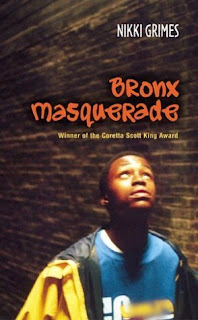
“When I was seven,
I looked to heaven
and dreamed
of going to the moon
but pretty soon
somebody came along
to change
my tune.
They put me down.
Bang! There my dream lay
on the ground.
Thank God, eventually
I came around
and dreamed
another dream.”
Bronx Masquerade, by Nikki Grimes, tells the story of Mr. Ward’s high school English class and the “Open Mike Fridays” that he provides so his students have a place to read their original poems and listen to those of their classmates. There is Wesley “Bad Boy” Boone, the one who started it all by refusing to write an essay on Langston Hughes and instead hands in a poem entitled ‘Long Live Langston’. He rationalizes his behavior, stating, “what’s the point of studying poetry and then writing essays? (4)” Fair enough. Mr. Ward allows Wesley to read his outstanding poem to the class but, being a teacher of integrity, expects him to hand in the essay the following week. Wesley’s reading lights a fire in several of the students and before you know it they all want a chance to read. Their poems break through superficial exteriors, reveal who they really are, and help them to make connections that allow them to express their feelings, heal wounds, and imagine futures and dreams they never thought possible.
Bronx Masquerade is told from multiple points of view. The reader gets a chance to discover the thoughts of each student in Mr. Ward’s class through brief first-person narratives followed by poems they wrote and plan to read on Open Mike Fridays. Between each narrative and poem, we hear from Tyrone Bittings, the young man who goes from refusing to believe in a future for himself to being the student who is most confident about his ability to write, rap, and “flow” at the poetry readings. Tyrone’s regular commentary serves to stabilize the story and connect each narrator, making Bronx Masquerade a cohesive tale rather than a collection of vignettes and poetry. In the end he speaks for all of the characters when he says, “I just wanted to say I’m really glad I got to do this poetry thing because I feel like, even though the people in our class are all different colors and some of you speak a different language and everything, I feel like we connected. I feel like I know you now. You know what I’m saying? I feel like we’re not as different as I thought. (164)”
Grimes created believable characters and put forth a hopeful message for all readers who need to hear that no matter where they come from or what their experience has been, they can not only have dreams, but can take steps right now to reach them. Also, Grimes beautifully illustrates that we don’t really know anyone until we have listened to what is in their hearts. This is an excellent book to use for teaching point of view, voice, and, of course, poetry. This book will help students understand the true power of poetry and might, like the review in Publishers Weekly states, “inspire readers to try a few [poems] of their own.”
